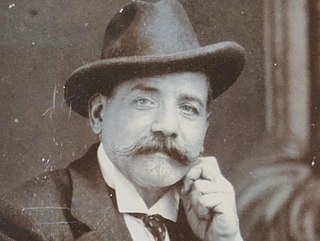
Giuseppe Calì was a Maltese painter of Italian descent.

Żurrieq is a town in the Southern Region of Malta. It is one of the oldest towns in the country, and has a population of 11,823 inhabitants as of March 2014. Żurrieq is one of the 10 parishes to be documented in 1436 and is dedicated to Saint Catherine. The island of Filfla is administratively a part of the town. The town stretches from Nigret to Ħal Far. In old times the town had a border with Żejtun. The village of Qrendi used to be part of the parish of Żurrieq until 1618 when it was made into its own parish.

Qrendi is a village in the Southern Region of Malta, with a population of 3,148 people as of October 2021. It is located close to Mqabba, Żurrieq and Siggiewi. Within its boundaries are two well-known Neolithic temples called Mnajdra and Ħaġar Qim. In this village two feasts are held annually. The feast of Our Lady of Lourdes is celebrated either on the last Sunday of June or the first Sunday of July, with 15 August the titular feast of the Ascension of Our Lady. This feast is popularly known as the feast of Santa Maria.

St. George's Basilica or the Basilica and Collegiate Parish Church of Saint George, also simply known as San Ġorġ in Maltese, is a historic Baroque church situated in the middle of Gozo, the second largest island in the Maltese archipelago, and is surrounded by a maze of old narrow streets and alleys. The church had been rebuilt numerous times during the Middle Ages. Today's basilica was built between 1672 and 1678.
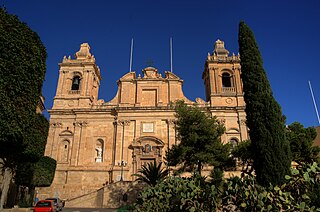
The Collegiate church of Saint Lawrence is an old Church situated in Birgu in Malta.

The Chapel of St Mary is a medieval chapel located in Bir Miftuħ, limits of Gudja, Malta.

The Church of the Assumption is a Roman Catholic parish church located in Qrendi, Malta.

The Church of the Nativity of Mary is a Roman Catholic baroque parish church located in Naxxar, Malta.

The Saint Publius Parish Church, also known as the Floriana Parish Church is a Roman Catholic parish church in Floriana, Malta, dedicated to Saint Publius. It was constructed at several stages between the 18th and 20th centuries.

The Church of St Bartholomew is a Roman Catholic Parish church in the village of Għargħur, Malta.
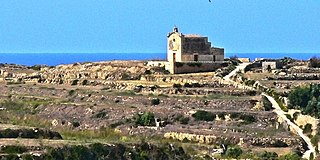
The Chapel of St Demetrius, more commonly known as San Dimitri Chapel, is a small rural Roman Catholic church located in Għarb, Gozo, Malta. This is the only church in Malta dedicated to this Greek saint.

The Chapel of St Andrew is a small Roman Catholic chapel located at the border the village of Żurrieq in Malta.

The Chapel of St Anne is a small Roman Catholic church located in the village of Qrendi, Malta.

The Chapel of the Transfiguration of Jesus or simply known as Our Saviour's or Tas-Salvatur is a Roman Catholic chapel located in the village of Qrendi in the south of Malta.

The Chapel of St. Paul the Hermit is a small church located in a cave in Wied il-Għasel, in Mosta, Malta.
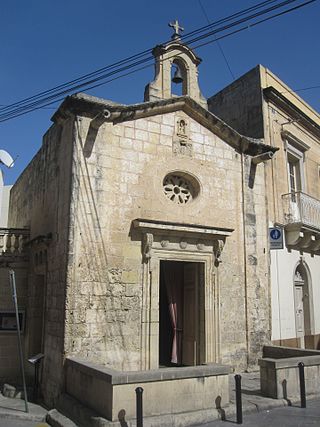
The Chapel of St Peter is a Roman Catholic 17th-century church in the village of Qormi in Malta.

St Catherine's Chapel officially the Church of St Catherine and St Peter is an 18th-century Roman Catholic church located in Mqabba, Malta.

Our Saviour's formally known as The Church of the Transfiguration of Jesus, popularly known in Maltese as Is-Salvatur is a Roman Catholic church located in the village of Żejtun, in Malta.

The Church of the Nativity of Mary also known as Victory Church is a Roman Catholic 17th-century church in the village of Qormi in Malta.
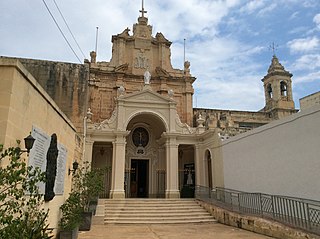
The Sanctuary of Our Lady of Tal-Ħerba is a Roman Catholic church in Birkirkara, Malta, dedicated to the Nativity of Mary. It was constructed at various stages between the early 17th century and the 1920s, on the site of an earlier church which had existed since at least 1575.























